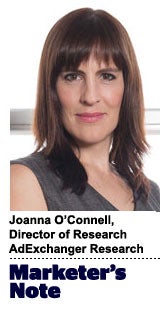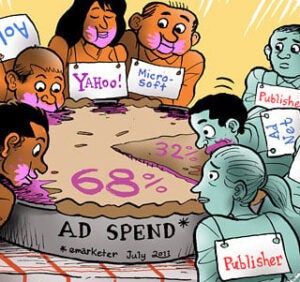 “Marketer’s Note” is a weekly column informing marketers about the rapidly evolving, digital marketing technology ecosystem. It is written by Joanna O’Connell, Director of Research, AdExchanger Research.
“Marketer’s Note” is a weekly column informing marketers about the rapidly evolving, digital marketing technology ecosystem. It is written by Joanna O’Connell, Director of Research, AdExchanger Research.
In an AdExchanger interview with Brian O’Kelley, AppNexus founder and CEO, late last week, Mr. O’Kelley made a bold proclamation (well, he made many, but today I’ll just focus on one): Agency trading desks must effectively function like “ad networks” in order to survive long term. I wanted to lend my perspective on this statement by asking some critical underlying questions:
- What does it mean to be an ad network? Mr. O’Kelley defined an “ad network” as, “A media company that makes money by selling media to agencies and buying media from publishers.” While we could easily argue semantics until the cows come home, on balance, I’d say it’s a fair definition. The problem for ad networks these days is that “ad network” has become a dirty word associated with giant margins, with lack of transparency, with underhanded back-office dealings. This is probably both fair and not: ad network stalwart ValueClick, in the face of sliding numbers, finally seems to be publicly jumping on the DSP bandwagon, while current IPO darling RocketFuel functions like an ad network, in as much as it’s managing the media buying and optimization on behalf of its clients. But I suspect those clients, for the most part, feel good about placing their money with RocketFuel because, presumably, it drives strong results.
- What does it mean to be an agency? This is a question I asked myself with great frequency when we were building the Razorfish trading desk, ATOM Systems, back in 2008. The formal definition of “agency”, according to Merriam Webster, is “the office or function of an agent.” OK, well what does it mean to be an “agent”? Back to Merriam Webster: “a person who does business for another person – a person who acts on behalf of another.” Call me naïve, fine, but the early trading desk model was about acting on behalf of clients to buy and manage media in smarter, more innovative and more directly controllable ways. I wanted the agency to benefit, yes, but believed it could be done in a way that was based on shared trust and mutual benefit (i.e. listen Ms. Client, we really and truly do need to charge more for this because it’s really and truly more difficult and complicated. But if we invest in doing it right, you will reap the benefits in better efficiency and performance.)
- Is there room for something in between? “Don’t call us a trading desk. We’re a programmatic media company.” So exclaimed Brian Lesser, CEO of massive agency holding company WPP Group’s Xaxis, on stage during AppNexus’ event. (In fairness, he was responding to a question.) When I heard this I immediately thought – wait, what’s a programmatic media company??? That sounds neither like an ad network, nor an agency. While the easy criticism is that it’s simply a semantics game designed to distance Xaxis from the increasingly scrutinized holding company “agency trading desk” moniker, my sense is that Xaxis has always been a little, well, different in its thinking, messaging and approach relative to the other holding company desks like Publicis’ VivaKi Audience on Demand (AOD) or IPG’s Cadreon. But describing Xaxis as a “programmatic media company” feels materially different, almost like it’s creating a new category in between the traditional ad network and the traditional agency where buying massive quantities of inventory from publishers (through both RTB and traditional modes) and overlaying it with a mix of client and licensed data is the explicit strategy rather than a dirty little secret.
So, what is the future of agency trading desks? I’ve long believed that the agency trading desk model of centralized service – with agency teams as “clients” – has no long-term legs. It keeps the agencies themselves from really understanding the fundamentals of next gen media management (think audience buying, programmatic) and creates far too much separation between clients and the ones actually managing their dollars. But at the end of the day, it’s up to clients to decide the future of trading desks. And no, this is not a cop out answer – it’s actually a call to arms. The goal should be for BOTH marketers and agencies to win, to have mutually beneficial, financially successful relationships. Perhaps the question then, should be – how to bring the benefits of an ad network business model to clients without undermining one’s role as “agent”? The answer may be, you can’t, at least not while inside the walls of a holding company. But, right now, we’re in an awkward in-between stage where the rules of client/agency relationships have the potential to evolve, but no one is steering the ship.
As always, I share my perspective in an attempt to drive meaningful dialogue and keep moving us forward. I invite all you marketers out there to do the same – lend your perspective! Remember, it’s your money!
Joanna
Follow Joanna O’Connell (@joannaoconnell ) and AdExchanger (@adexchanger) on Twitter.













